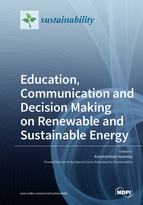Education, Communication and Decision Making on Renewable and Sustainable Energy
A special issue of Sustainability (ISSN 2071-1050). This special issue belongs to the section "Sustainable Education and Approaches".
Deadline for manuscript submissions: closed (30 September 2019) | Viewed by 44421
Special Issue Editor
Interests: forest informatics; decision support systems; expert systems; spatial planning of RES multicriteria decision analysis; sensor networks; artificial neural networks and computing
Special Issues, Collections and Topics in MDPI journals
Special Issue Information
Dear Colleagues,
During the last two decades, we have witnessed an evolution in the energy sector. Many countries throughout the world have been shifting their energy production methods from fossil fuel usage to more environmentally-friendly methods. These methods are described under the term Renewable Energy Methods and propose the usage of Renewable Energy Sources (RES) based on wind, water, biomass, solar and geothermal energy for the production of energy. This shift is mainly caused by the increase in public awareness on environmental problems and climate change, which are both related to the increase in Green House Gas (GHG) emissions.
The scope of this Special Issue is to attract researchers whose scientific interests reside in research on the level of integration of RES and its acceptance among citizens, the educational framework of RES at the various educational levels, as well as the level of social acceptance of RES application. Additionally, we will also aim to attract researchers working in the field of decision making regarding RES; their selection and installation.
The purpose of this Special Issue is the determination of the factors affecting the dissemination of RES to the public, the factors that cause a negative attitude towards the usage of RES, as well as the factors affecting decision making regarding the implementation and installation of RES. Furthermore, we will also explore the methodologies and tools used for presenting RES, and sustainable energy in general, to students at various educational levels as well as to the general public.
References:
- Lefkeli, S., Manolas, E., Ioannou, K., Tsantopoulos, G. Socio-cultural impact of energy saving: Studying the behaviour of elementary school students in Greece (2018) Sustainability (Switzerland), 10 (3), art. no. 737.
- Helena Mälkki, Kari Alanne, An overview of life cycle assessment (LCA) and research-based teaching in renewable and sustainable energy education, Renewable and Sustainable Energy Reviews, Volume 69, 2017, Pages 218-231, ISSN 1364-0321, https://doi.org/10.1016/j.rser.2016.11.176.
- Arif Sari, Murat Akkaya, Contribution of Renewable Energy Potential to Sustainable Employment, Procedia - Social and Behavioral Sciences, Volume 229, 2016, Pages 316-325, ISSN 1877-0428. https://doi.org/10.1016/j.sbspro.2016.07.142.
- Jamal O. Jaber, Wael Awad, Taieseer Abu Rahmeh, Aiman A. Alawin, Suleiman Al-Lubani, Sameh Abu Dalu, Ali Dalabih, Adnan Al-Bashir, Renewable energy education in faculties of engineering in Jordan: Relationship between demographics and level of knowledge of senior students’, Renewable and Sustainable Energy Reviews, Volume 73, 2017, Pages 452-459, ISSN 1364-0321, https://doi.org/10.1016/j.rser.2017.01.141.
- Tara C. Kandpal, Lars Broman, Renewable energy education: A global status review, Renewable and Sustainable Energy Reviews, Volume 34, 2014, Pages 300-324, ISSN 1364-0321, https://doi.org/10.1016/j.rser.2014.02.039.
- John A. Paravantis, Eleni Stigka, Giouli Mihalakakou, Evanthie Michalena, Jeremy M. Hills, Vasilis Dourmas, Social acceptance of renewable energy projects: A contingent valuation investigation in Western Greece, Renewable Energy, Volume 123, 2018, Pages 639-651, ISSN 0960-1481, https://doi.org/10.1016/j.renene.2018.02.068.
- Caglayan Acikgoz, Renewable energy education in Turkey, Renewable Energy, Volume 36, Issue 2, 2011, Pages 608-611, ISSN 0960-1481, https://doi.org/10.1016/j.renene.2010.08.015.
- Akash Kumar Shukla, K. Sudhakar, Prashant Baredar, Renewable energy resources in South Asian countries: Challenges, policy and recommendations, Resource-Efficient Technologies, Volume 3, Issue 3, 2017, Pages 342-346, ISSN 2405-6537, https://doi.org/10.1016/j.reffit.2016.12.003.
- Hsing-Chen Lee, Ching-Ter Chang, Comparative analysis of MCDM methods for ranking renewable energy sources in Taiwan, Renewable and Sustainable Energy Reviews, Volume 92, 2018, Pages 883-896, ISSN 1364-0321, https://doi.org/10.1016/j.rser.2018.05.007.
- Yakup Çelikbilek, Fatih Tüysüz, An integrated grey based multi-criteria decision making approach for the evaluation of renewable energy sources, Energy, Volume 115, Part 1, 2016, Pages 1246-1258, ISSN 0360-5442, https://doi.org/10.1016/j.energy.2016.09.091.
Dr. Konstantinos Ioannou
Guest Editor
Manuscript Submission Information
Manuscripts should be submitted online at www.mdpi.com by registering and logging in to this website. Once you are registered, click here to go to the submission form. Manuscripts can be submitted until the deadline. All submissions that pass pre-check are peer-reviewed. Accepted papers will be published continuously in the journal (as soon as accepted) and will be listed together on the special issue website. Research articles, review articles as well as short communications are invited. For planned papers, a title and short abstract (about 100 words) can be sent to the Editorial Office for announcement on this website.
Submitted manuscripts should not have been published previously, nor be under consideration for publication elsewhere (except conference proceedings papers). All manuscripts are thoroughly refereed through a single-blind peer-review process. A guide for authors and other relevant information for submission of manuscripts is available on the Instructions for Authors page. Sustainability is an international peer-reviewed open access semimonthly journal published by MDPI.
Please visit the Instructions for Authors page before submitting a manuscript. The Article Processing Charge (APC) for publication in this open access journal is 2400 CHF (Swiss Francs). Submitted papers should be well formatted and use good English. Authors may use MDPI's English editing service prior to publication or during author revisions.
Keywords
- Renewable Energy Sources;
- Sustainability Assessment and Policy;
- Socio-Economic Impact;
- Educational Impact;
- Multi-Disciplinary Energy Issues






